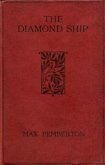In this inventive and comical novel and his first work of satire James Fenimore Cooper skewers American and British politics. Here is the story of Sir John Goldencalf, member of British society, and American Captain John Poke, as they accompany four highly intelligent, and conversant, monkeys back to their homeland. The novel, narrated by the main character, the English Sir John Goldencalf, is a satire. Goldencalf and the American captain Noah Poke travel on a series of humorous adventures.
Bitte wählen Sie Ihr Anliegen aus.
Rechnungen
Retourenschein anfordern
Bestellstatus
Storno









